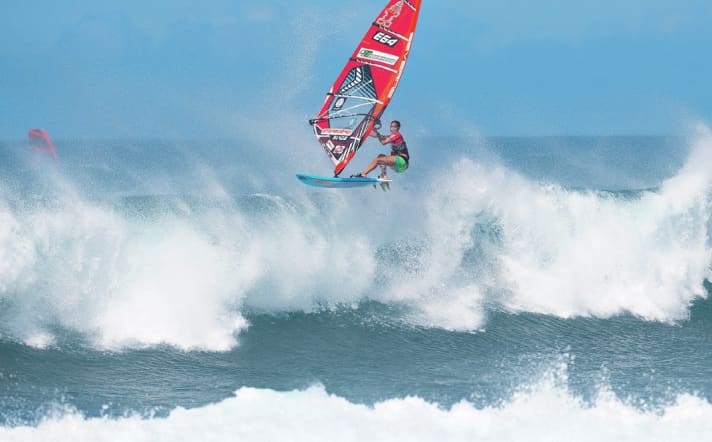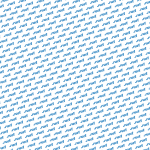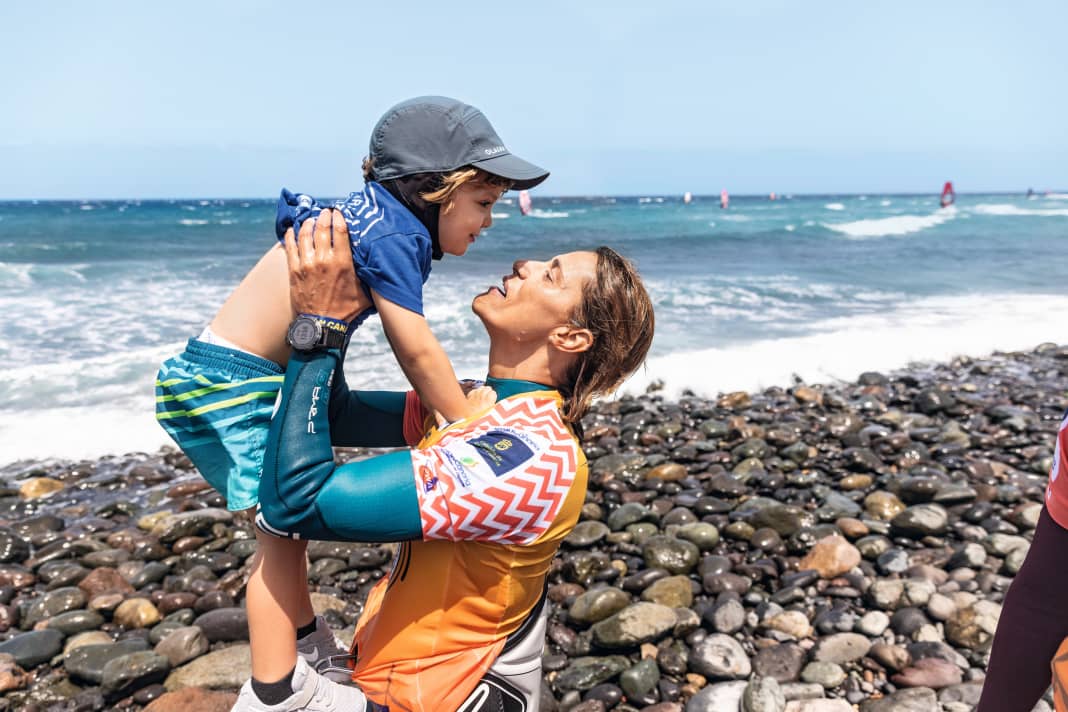





They are still closely connected today, but they are independent, strong women with different fates. Now Daida is saying goodbye to the World Cup. Lina Erpenstein met the Queen of Pozo for an exceptionally frank interview.
Only very few athletes are given the honour of having a statue dedicated to them during their active career. The twins Daida and Iballa Ruano Moreno have done it: on the promenade of their home spot Pozo Izquierdo sits a huge metal surfboard with the sail numbers E-63 for Iballa, E-64 for Daida and the E-11 of another not entirely unknown windsurfer from Gran Canaria cut out of the steel. (Dunkerbeck used the sail number E-11, with which he competed for Spain).
The Moreno twins - Daida and Iballa marketed themselves under this brand name for more than two decades - have 28 PWA world championship titles between them. There are no more successful twins in the sporting world. Daida Moreno can also rightly be celebrated as the "Queen of Pozo", having won her home World Cup 22 times. 2023 will be her last success, she says. After her victory this year, the 45-year-old exceptional athlete announced her retirement from professional sport. Shortly afterwards, she gave Lina Erpenstein, who herself had just finished third in Pozo, an exceptionally open interview.
Daida, 18 World Championship titles, and more recently 22 Pozo World Cup titles, how does it feel to announce your retirement now?
I feel very relieved. It was a very deliberate decision that had been floating around in my head for a few years. If my sister hadn't also been on the tour, I would probably have quit much earlier. What's more, I've only taken part in one or two events in recent years as I wasn't striving for another world title. In the end, competing is very nerve-wracking and now that I have a son, it's just more stress. In 2019, I already announced my retirement from professional windsurfing as I was trying to start a family at the time. I experienced four miscarriages and was mentally very challenged by the whole situation. So announcing my retirement was a great relief. And now with a child, I have to say it's become quite impossible to train professionally, travel and win more titles. There is a good base of young girls and women with a good level, and for me it feels good to leave the stage to them. It's not like when I started and there were only eight of us. It's a good base and I see a good future. And I will continue to help get more women and children interested in windsurfing.
When you think back on your career, which moments stand out the most for you?
I have to say there were three moments: The first was my first world title in 2000. The second was in 2012, when I came second at the World Cup here in Pozo, behind Iballa. And that was just four months after I had finished my chemotherapy. I was incredibly happy to be back on the podium, as I had never imagined I would be able to compete again so soon. It was an incredible feeling. And the third moment was actually just recently, when I decided to stop. I actually wanted to stop competing in the World Cup this year, but I didn't want to announce my retirement right before the contest. So two weeks before the event, I decided to take part one last time and then stop.
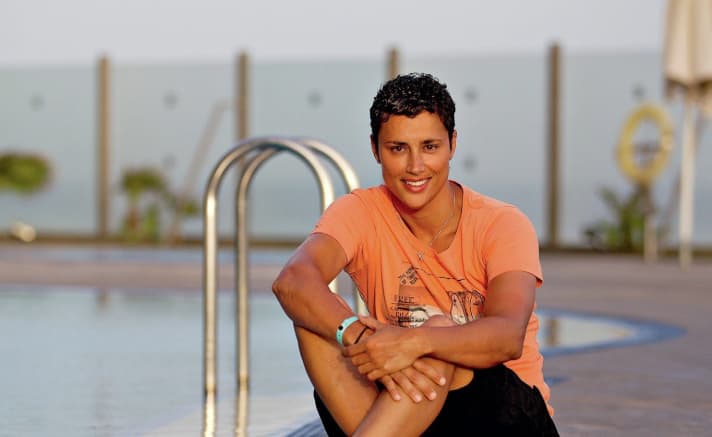
Of course there were also tough times in your career. Tell us a bit about those times. What was it like for you? How did windsurfing help you through those times?
For me, health is everything. It also drove my decision to quit. Having cancer at 33 and watching people around me die from the disease was very hard. It helped me a lot to make my documentary film about how I went through that time and how windsurfing helped me through those tough times. At the same time, windsurfing also caused me a lot of stress because of the pressure of competing, especially in places like Sylt and Maui where I wasn't used to the conditions and could never realise my full potential. Nevertheless, I've always enjoyed windsurfing. Free surfing and pushing my limits really fascinates me, and if I don't hurt myself, I'll always keep going. But for me, it no longer has to be linked to competitions. 26 years of competitions - I don't have to prove anything anymore. And I think now is a good time for me to stop.
How has women's windsurfing developed during your career? Do you see good developments? Do you see things that you don't like?
My biggest goal over the last 26 years has been to get more women into professional windsurfing and to achieve equal prize money. And I think we're pretty close to that. It's not 100 per cent equal prize money yet, but it's very close. The number of women competing has increased significantly, as has the level of heats. I've seen the level rise throughout my career and I'm incredibly happy about that. And I really hope that many of these women can stay on the tour long enough to be examples for younger generations.
I've seen so many different generations of women, and that's hard for me to see, because women retire from professional careers much earlier than men. Many have to study, don't want the "hippy life" for too long, want to start a family and want and need money. And this support is not available from sponsors. That's why it's incredibly difficult for women to maintain a high level over a long period of time. Women end their professional careers at a much younger age than men and therefore the level stagnates for longer. One positive development I see is better equipment, especially designed for women and lightweight people. With these boards and sails, many are coping much better and can realise their full potential. I'm also pleased that Severne has a really large female team. The other brands should also do more. Brands should promote a stronger image of women and provide their female athletes not only with equipment, but also financially in order to offer the best training opportunities. Because only with sufficient financial support can women make a living from windsurfing long enough to dedicate themselves to the sport professionally.
I will continue to help get more women and children interested in windsurfing.
You've already mentioned it: Equal Prize Money. You played a big part in this development. Tell us a bit about it.
When I started, women had a ten per cent share of the total prize money. We fought very hard to change that and managed to separate the prize money for men and women into two separate pots. At that time, 10,000 euros went to the women and 50,000 euros to the men. Shortly afterwards, we were at 15,000 and 35,000 for the men. It stayed like that for many, many years. It was only a few years ago that we were able to convince event organisers and politicians that equal prize money should be implemented, not only in windsurfing but also in many other sports. It was an incredibly long and hard road and struggle.
There have been situations where I've been physically attacked by men because I've heard them talking badly about women and I've told them to stop: "Women can't windsurf, they're stealing our prize money". A guy once tore my T-shirt and pushed me against the wall because I told him to shut up. The situation has got a lot better, but even now active professionals still think that women take prize money from men. And that is so wrong! There are two separate pots, men and women, that's all. But a lot of macho thoughts remain in people's heads. It's always a battle.
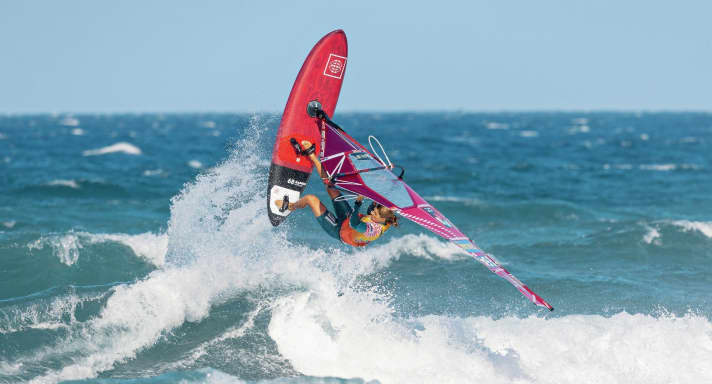
What do you think yourself? Has your dominance over the years motivated women to become better than you, or rather frustrated them because they felt they could never overcome you?
I train for myself and don't think about what others think. I always want women to push their own boundaries. Because that's the only way we'll get more respect in the future. For me, helping women to become better windsurfers is a great goal. Whenever I'm in the water, I try to give tips. If someone asks me for tips, I will always be there for them. I never train thinking about what other women think about me. I always try to motivate myself and compare myself to men. And I think that's the best way to become a better windsurfer.
Going into the race as the favourite for years is certainly not easy. How did you deal with the pressure?
I always felt very comfortable in Pozo. Of course there is a lot of pressure, but that was mostly away from the water. Judges expect more from you, others are overrated, people talk - all these pressures are constantly coming at you. I've tried to stay away from it because it just frustrates you. Of course I understand that I'm the one everyone wants to beat, and that's a good feeling. I've always tried to respond with respect and humility, because if people can't show that, it's not right. You earn respect over a long period of time and with your performance in the water. And in the end, it makes you feel better about yourself. Being a twin is a special life situation. Competing with your twin at the highest level for world championship titles couldn't be more unique.
How did that affect your relationship with Iballa?
Travelling together, sharing the same passion, wind and waves, spending so much time together, that is truly unique. Only the Tarifa Twins will understand that. They will experience it over time, because they are still very young. Having a twin sister next to you who is always challenging you to be better is really nice.
Isn't it also a lot of pressure?
There was no pressure, but in the end only one of us could win. Sometimes she won, sometimes I won, sometimes Sarah-Quita won. It's hard, because of course everyone wants to win, but that's competition. But there is so much more life around the competition life that we have always been able to share. For us, all the trophies have come home to us, to everyone in the family. Iballa has ten, I have 18 world titles, I don't think that's too bad.
Having a twin sister who always challenges you is really nice.
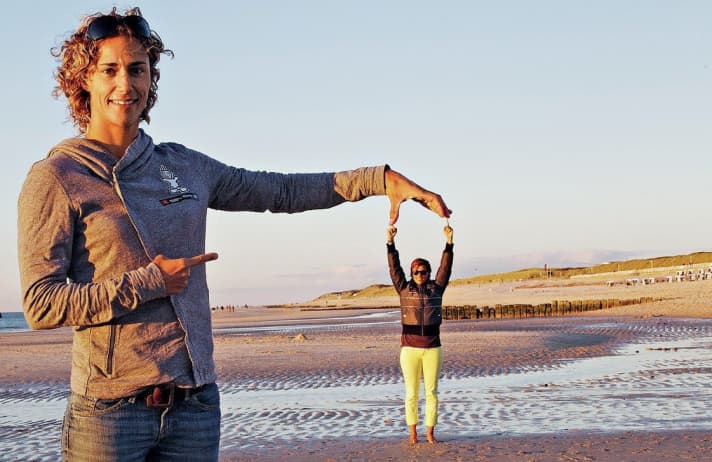
You were also an event organiser for many years. How has this influenced your career?
This has influenced my career 100 per cent, because I have started to experience both sides. As a rider, it's sometimes very frustrating to see how much better a competition could be if only this or that was done differently. The organiser's perspective is much more complex: you're managing a very small budget and trying to put on a big event where everyone is happy. That's a pretty big challenge. Together with my sister Iballa, we organised the event for eight years and it was incredibly tiring. I was basically burnt out. Once I realised that, I started to cut back so that I could spend more time with my son, because that's my biggest goal.
Shortly before the event in Gran Canaria, you surprised us by switching to a new board sponsor. You've recently started travelling on Bruch boards. How did that come about?
Dani (Bruch) and I have had a very close, friendly relationship for many years. I always told him that I would support him in his projects. And I think it was a good time. Severne wanted to support younger female athletes and the exchange was good for both sides. I feel that Dani's boards have allowed me to improve my wave riding even more and I'm looking forward to what will be possible in the future. I have a lot of fun with the boards and am in close contact with Dani in the development of the prototypes. I never had this communication with bigger brands. I am very grateful to have found this now and we are working on a long-term collaboration. In the end, he is trying to make a living from a small brand and I am supporting him. I think that's a pretty good deal for both sides.
Will you continue to ride for Bruch and Severne even without competitions?
Yes, I will definitely continue to work with Dani. I have a contract with Severne until December and then we'll see what happens next.
What's next for the Moreno Twins Club?
It will definitely continue. We founded it in 2001 to give lessons for women and children. Now the idea is to expand this even further. More clinics, more projects et cetera. Next week, for example, I'll be going to various schools and talking to the children about windsurfing. We can't reduce all windsurfing to competitions, because there's so much more to it. There are people who compete and people who don't compete. I've played through competitions by now (laughs). Everything I do, I do as well as I can. That's probably why I'm often so stressed, but that's just the way I am.
What else is on your "windsurfing bucket list"? Double loops in Pozo?
Double forward loops are definitely on the list. I'm relatively close. I've already landed a few, all of them unfortunately not captured on camera. But we'll get round to it! I also think you (Lina) can do them, I've already seen you try, it's possible! Okay, pushloop forward, that's a really tough move. Only the top 7 men can really do it consistently. I've thought about it a lot. Ricardo (Campello) has been trying to get me to do it for years, but I don't think I have the age or the physical strength to do it. Mentally yes, but physically no, because you have to be incredibly strong for that move. It's definitely not on my list, but it's still floating around in my head somewhere. I also want to land more wave moves consistently: Goiter, Wave360, Shakas, because that's what I really love. I've become a lot more selective when it comes to jumping, maybe it's age (laughs).
Windsurfing in Pozo is extremely hard on the body and you have to be super fit to endure it. I'm going to keep trying! Some people say to me: "Hey, even if you don't train until next year, you'll win again". But winning is no longer important to me. I care about myself and don't want the pressure anymore. That's the real reason why I'm quitting. My motivation is to land new moves, produce cool videos, teach others. And not to base all my marketing on contests alone.
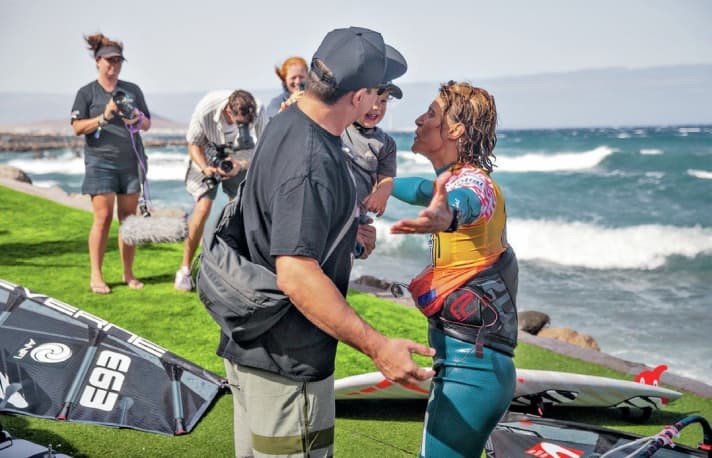
What do you want to focus on in the future? Will you still spend the same amount of time in the water or will you concentrate more on your family and physiotherapy?
In fact, not much will change at all. During the week, my day looks like this: I take my son to school, work, windsurf, pick him up. If the conditions are really good in the afternoon, I go out on the water again as soon as his father is home, otherwise I work. My weekdays are basically working and windsurfing and spending time with my son. At the weekend, I do sport most of the time. Road cycling, I love it and have actually taken part in a few competitions (laughs). But my goal is more to cover the distance than to actually compete. I love a challenge.
What makes a world champion?
Very, very hard work. Support, not only from sponsors, but also from family and friends. Mental strength and imagination, because you always have to think about what you want to achieve. Dream about it. Keep going out on the water until you achieve it. Write down your moves, your goals, dream about it, videos, coaching, it's all part of it. I see some women doing this and it's extremely effective. With a bit of luck at the beginning and a lot of dedication, a world champion can do it. And once you have a title, you have to triple all that to keep the title. Over the years, it gets more and more difficult and challenging, because new generations come up from below who also want the title. It's like a hamster wheel that only stops when you pull the ripcord.

If you could say something to 19-year-old Daida, who is just starting her career, what would it be?
In my very first interview, when I was 19 years old, I said: "I want to be known in a wetsuit". All my photos in Forza7 magazine were in a wetsuit. Because I wanted to be known for my windsurfing and not for my body, my face or my presence. It's totally okay if people choose that for themselves, but I never wanted that. Women and even female athletes who market themselves through their appearance are still often paid more.
How do you deal with it?
This is a huge issue. The brands that should be supporting us as athletes are often better at supporting models. It's incredibly frustrating. I've fought my whole life to change that. If someone wants to support me, it's about me as an athlete and what I do, because I train incredibly hard to achieve my goals. But in the end, there are others who also windsurf but market themselves through external features and get paid much better. It's incredibly frustrating because I don't think men get sponsored based on their looks. And that's exactly what they do to women. It's the same battle as with prize money. It never ends and we've come a long way, but now I'm leaving that battle to the younger generation because I've been fighting it for the last 26 years.
What would you say to a young girl today who wants to become a professional windsurfer?
Find your own personality and stay true to it. Never stop learning. That's how you'll earn respect. Always try to have fun, travelling, learning, because windsurfing is a lifestyle.
What are your wishes for the future? What are you looking forward to the most?
The future is now. I want to teach more because I really enjoy it and I've never had the time. Especially with women and children.
Thank you for your time and all the best for the future.
